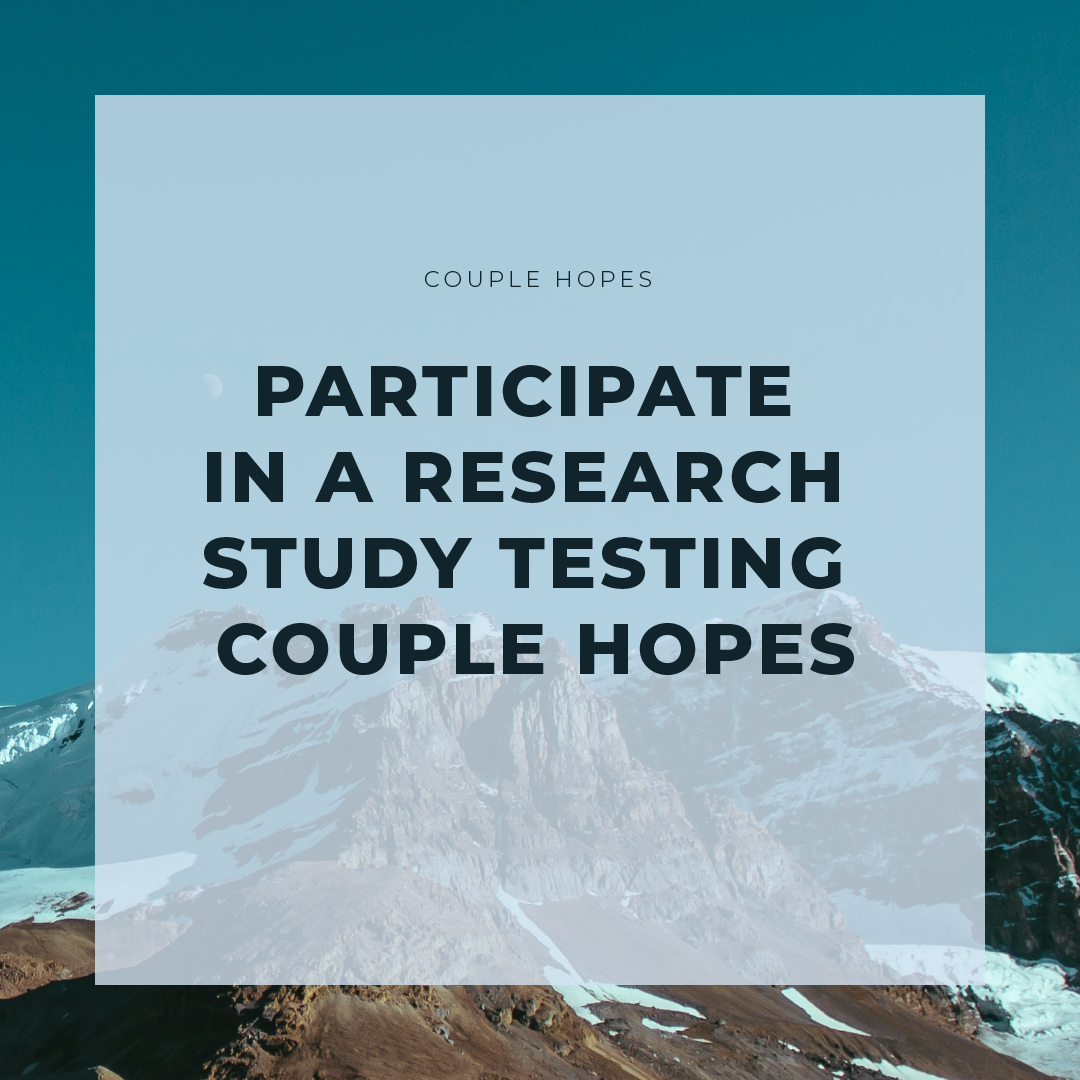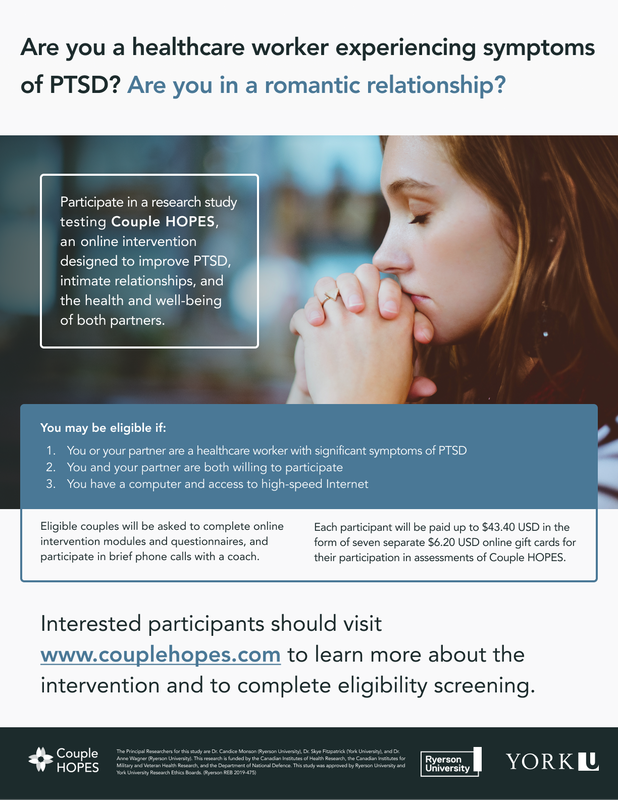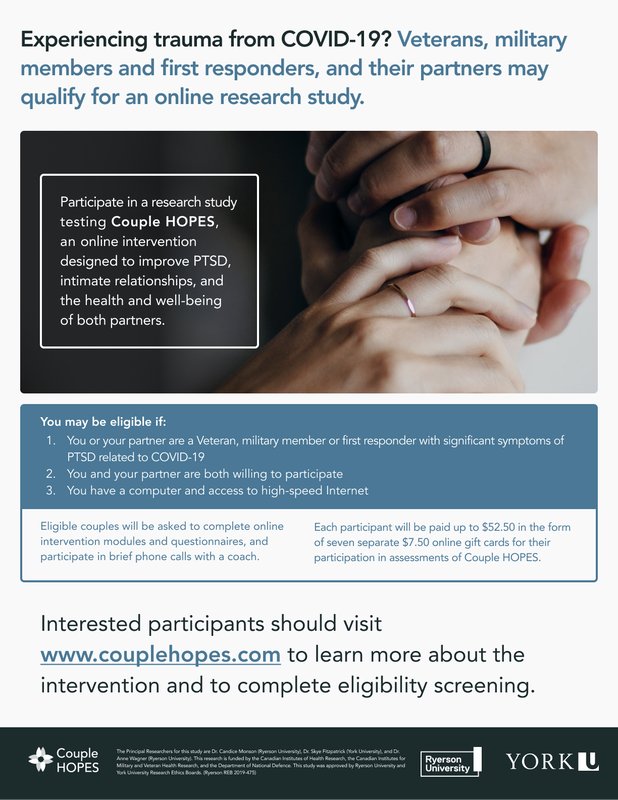|
The TULiP Lab is currently recruiting couples for this study where at least one partner is experiencing PTSD symptoms or struggling with stress in relation to a COVID-19 event. Please visit the Couple HOPES website to complete the eligibility screening.
Posttraumatic stress disorder (PTSD) is a common and disabling condition associated with intimate relationship problems and mental health problems in partners of those with PTSD. Recognizing the need to improve access to evidence-based interventions for those with PTSD and their families, our research team has developed an Internet-delivered, self-help intervention to improve PTSD, enhance relationships, and improve partners’ mental health: Couple HOPES (Helping Overcome PTSD and Enhance Satisfaction)
|
Couple HOPES is comprised of seven interactive modules that systematically target PTSD symptoms and enhance relationship functioning. These modules cover the following topics: (1) Psychoeducation on PTSD symptoms and relationship functioning, (2) safety building in relationships and introducing skills to manage relationship conflict, (3) communication skills, (4) approaching situations, conversations, and experiences that are avoided as a result of PTSD symptoms, (5) sharing feelings, (6) sharing thoughts, and (7) consolidating intervention gains and relapse prevention. Each online module contains (1) web-streamed videos and activities that are approximately 30 minutes in length; (2) interactive exercises and homework for couples to complete between modules; and (3) messaging with a paraprofessional Coach before and after the module to troubleshoot homework completion and use of the platform, monitor PTSD symptoms and relationship satisfaction, clarify information as needed, and encourage the use of the platform.
The proposed three-phase project aims to refine and finalize Couple HOPES. In Phase 1, a series of 10 couples with at least one partner who is a Canadian healthcare worker, military member, Veteran or first responder, or American healthcare worker, with clinically significant PTSD symptoms and their intimate partners will receive the intervention and will provide initial qualitative and quantitative data on safety, efficacy, and usability. These cases will be used to iteratively refine the intervention. In Phase 2, we will test the safety, efficacy, and usability of the finalized Couple HOPES intervention in an uncontrolled trial with 20 couples wherein one partner is a Canadian military member, veteran, or first responder with clinically significant PTSD symptoms. Lastly, in Phase 3, we will conduct a randomized controlled trial (RCT) comparing Couple HOPES against a delayed intervention group (all couples will receive the intervention within 2 months) to assess safety, desirability, and efficacy in 70 couples with at least one partner who is a Candian military member, veteran, or first responder with clinically significant PTSD symptoms and their intimate partners across Canada.
The potential benefits of this study include couples learning new skills to reduce PTSD symptoms and enhance relationship functioning, although this is not guaranteed. Risks include participants finding the assessments distressing, or possible worsening of PTSD symptoms or relationship functioning. These risks will be mitigated by continuous monitoring of PTSD symptoms, relationship functioning, and adverse events, and intervention by study staff.
The proposed three-phase project aims to refine and finalize Couple HOPES. In Phase 1, a series of 10 couples with at least one partner who is a Canadian healthcare worker, military member, Veteran or first responder, or American healthcare worker, with clinically significant PTSD symptoms and their intimate partners will receive the intervention and will provide initial qualitative and quantitative data on safety, efficacy, and usability. These cases will be used to iteratively refine the intervention. In Phase 2, we will test the safety, efficacy, and usability of the finalized Couple HOPES intervention in an uncontrolled trial with 20 couples wherein one partner is a Canadian military member, veteran, or first responder with clinically significant PTSD symptoms. Lastly, in Phase 3, we will conduct a randomized controlled trial (RCT) comparing Couple HOPES against a delayed intervention group (all couples will receive the intervention within 2 months) to assess safety, desirability, and efficacy in 70 couples with at least one partner who is a Candian military member, veteran, or first responder with clinically significant PTSD symptoms and their intimate partners across Canada.
The potential benefits of this study include couples learning new skills to reduce PTSD symptoms and enhance relationship functioning, although this is not guaranteed. Risks include participants finding the assessments distressing, or possible worsening of PTSD symptoms or relationship functioning. These risks will be mitigated by continuous monitoring of PTSD symptoms, relationship functioning, and adverse events, and intervention by study staff.
|
Are you and your partner interested? Have questions for the research team?
|
Watch the Couple HOPES INTRO VIDEO
Video Transcript: Couple HOPES is an online self-help program for people who struggle with symptoms of PTSD and their intimate partners. At Couple HOPES our goal is to empower you and your partner to fight against PTSD symptoms together and enhance your relationship at the same time. Couple HOPES is based on a couple therapy for PTSD that I developed. Scientific studies have proven it to be effective in improving PTSD and enhancing relationships as a self-help program. Couple HOPES is built on the key elements of this effective couple therapy for PTSD. Here's how Couple HOPES works. We've created seven modules for you and your partner that are based on the science of helping PTSD in relationships. Each module contains training videos and exercises to teach you new skills to enhance your relationship and overcome PTSD. You will be assigned a coach who will message with you through the couple hooks platform to help you get the most out of the program. While your coach is not a therapist, they will help make sure you're understanding and using those new skills. Before each module we assess PTSD symptoms and relationship satisfaction so that you can monitor your progress throughout the program. We're delighted that you are considering Couple HOPES, and we hope that you will join us in taking the next step to overcome PTSD symptoms and enhance your relationship.



